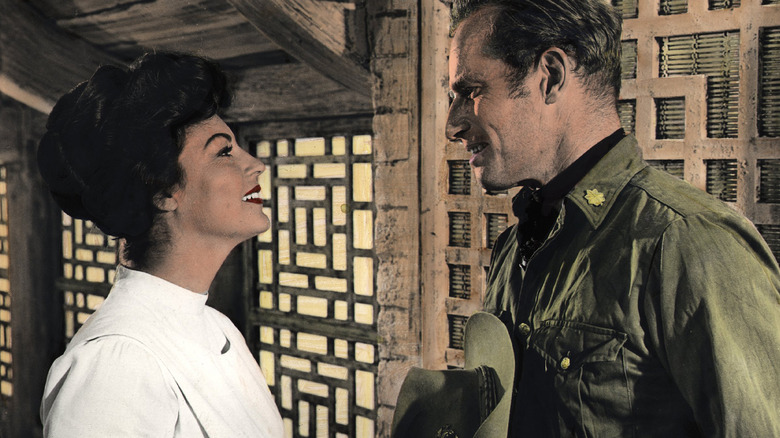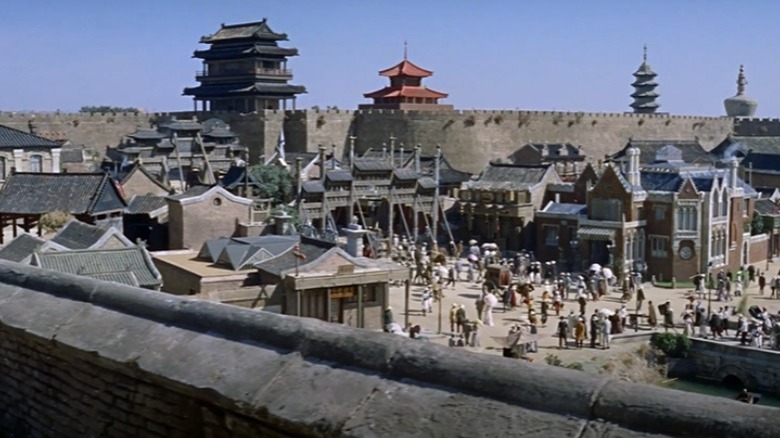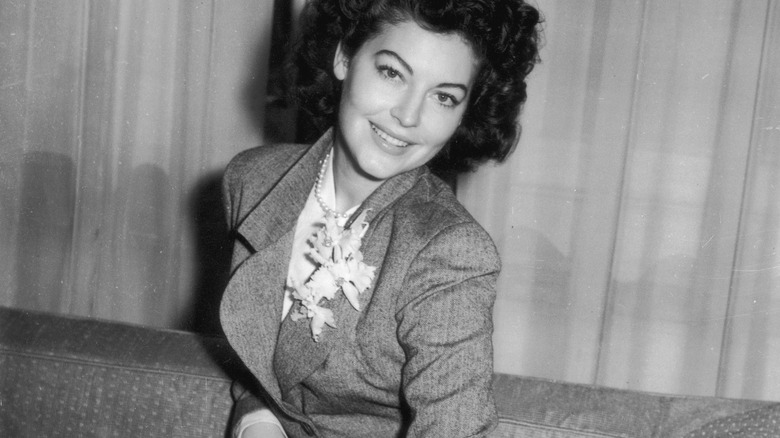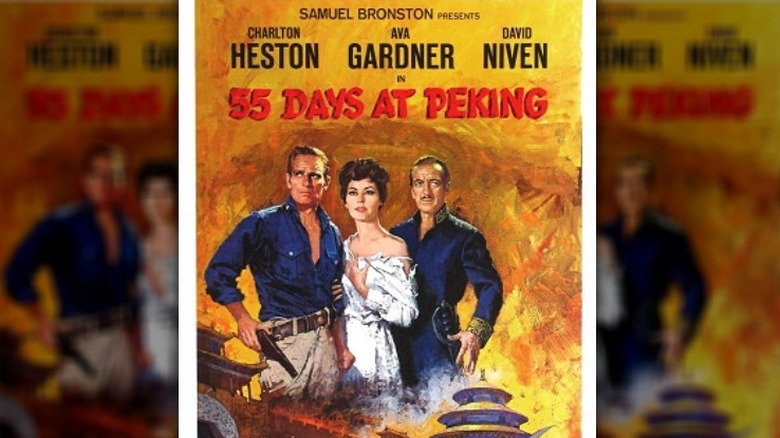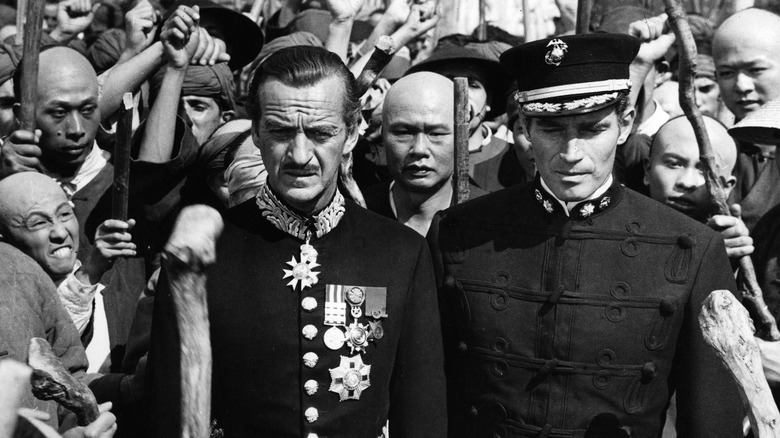55 Days At Peking: Why The Classic Film Was One Of The Most Unstable Movies Ever Filmed
It's no secret that movie production can be a difficult and stress-filled time; after all, an entire category of gossip subsists on "behind the scenes" rumors. However, the 1963 war epic "55 Days at Peking" might take the crown in behind-camera issues that nearly matched the drama onscreen. The star-studded film, which runs around two and a half hours, focuses on the story of the Battle of Peking, a landmark event of the Chinese Boxer Rebellion in 1900. It has a notable cast, including mega-stars like Ava Gardner, Charlton Heston, and David Niven, per Britannica.
Though the movie was nominated for two Academy Awards, it was a commercial wash and earned lukewarm reviews. That said, the movie's financial success was severely limited by its bloated budget — a function of so many mishaps behind the scenes that the film's production could easily be considered one of the most unlucky in Hollywood history.
Some of the production's woes were the fault of poor planning. For example, since Communist China was self-isolated from the outside world throughout the 1960s, the studio decided to build a massive set, totaling a whopping 240,000 square meters, on the outskirts of Madrid to mimic Peking, now known as Beijing. According to the Flying-Dutchman, though the sets were celebrated as "admirably accurate" replicas of the city, down to the sewers, the need for Chinese extras in Southwest Spain became a major issue.
Missing extras and missing directors
With few Chinese immigrants in Spain, the studio widened its search to "Asian-looking" adults; however, even with these dubious standards, only around 300 suitable extras were found for "55 Days at Peking." Eventually, the remaining 1,200 Chinese extras required by the script ended up being discovered and flown in from countries like Great Britain, Italy, France, and Portugal, according to the Flying-Dutchman.
But it wasn't just finding extras that proved to be a problem — the position of director proved difficult to fill. The original director of the film was Nicholas Ray of "Rebel Without a Cause" fame. However, Ray collapsed and suffered a heart attack halfway through filming, per Slant Magazine. Though Ray's substance abuse likely played a role, it was rumored that the strain of dealing with the cursed "55 Days at Peking" production had played a part. In fact, some Hollywood insiders claimed the heart attack was coupled with a nervous breakdown and Ray had consistently "not [showed] up" to work, per The A.V. Club.
Whatever the truth, Ray was replaced — by both Guy Green and then by Andrew Marten (via IMDb). With consistently shifting crew members, filming was never going to be easy. However, few could have predicted that a woman once considered the ultimate Hollywood icon would prove to be an even bigger obstacle.
A petulant movie star
One of the biggest issues during the production of "55 Days at Peking" was the behavior of Ava Gardner. According to the biography "Ava Gardner: Love is Nothing" by Lee Server, things immediately got off to a bad start when Gardner called the script "[expletive] lousy" during the first read-aloud. Her co-star, Charlton Heston, later recorded in his diary that her tantrum had led to a "macabre evening."
Gardner's lack of faith in the script presented itself in other ways, and she quickly appeared to be disinterested in the success of the movie. "We had a great deal of trouble with [Gardner]," later confessed screenwriter Philip Yordan, who had previously worked with the "Show Boat" star. She really didn't want to work ... Maybe she needed the money. She had trouble concentrating at times. She was late. She didn't know her lines."
Another screenwriter for "55 Days at Peking," Bernard Gordon, noted that Gardner's excessive drinking did not help matters. "She was drinking all the time," he said, adding that there had been rumors she had been kicked out of the Ritz in Madrid for her intoxicated behavior.
There was one day of filming that was particularly bad. An extra had innocently taken a photograph of Gardner. She reportedly went wild and insisted the man be "found, fired, and stripped of his film." But that wasn't the end of the story.
Gardner's antics would only get worse
Ava Gardner retired to her dressing room for two hours while the studio obliged her request in the hope that the actor would quickly return and filming of "55 Days at Peking" could resume. However, when Gardner finally returned to the set, she claimed she once again heard the click of a camera. She made the same demand again, shutting down production to find the culprit.
But the issue is that no culprit could be found. Her colleagues believed Gardner had imagined the entire ordeal — whether due to mental anxiety or her drinking. However, the end result was the same: Another day of potential filming had to be postponed (via "Ava Gardner: Love is Nothing").
Eventually, the "55 Days at Peking" production team decided that the fewer scenes with Gardner, the better. Many of her lines were given to other characters, and her death scene was actually filmed without her — the editing team managed to use hackneyed clips and the deceptive use of a sheet over a body that looked like Gardner's. It was a sad and messy end to her troubling behavior.
Gardner wasn't the only troublemaker
That said, Ava Gardner wasn't the only actor in the film to cause trouble. The lackluster script for "55 Days at Peking" had also failed to impress Charlton Heston and David Niven, and the two brought in their own screenplay writers to add speeches and scenes in order to beef up their own roles.
In fact, Niven reportedly refused to work at one point if he didn't get a new dramatic monologue. Rewrites were constant, claimed Bernard Gordon, one of the original authors of the screenplay, and only added needless bloat to the movie and budget. "If rewriting the script was for the purpose of making the picture better, you didn't mind," he said. "But a lot of it was to keep the stars happy, who were all prima donnas, like spoiled children" (via "Ava Gardner: Love is Nothing").
The film, with its troubled production and lackluster release, still does not find champions even in the modern world. For starters, many critics have pointed out the colonialist undertones of the script, per The Racket. However, even worse is that some Asian roles were played by Caucasians who wore makeup to mimic Asian features — a practice commonly known as "yellowface."
Though those practices were not uncommon in Hollywood at the time, they're widely considered inappropriate today. As such, it seems more than likely that "55 Days at Peking" will retain its cursed reputation in the decades to come.
